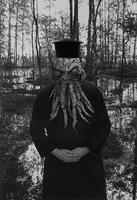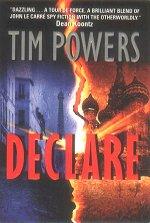 Our good friend Cthulu is one of the Elder Gods "of which we must not speak" from the Lovecraft mythos. It's Lovecraftian if it focuses on humanity's insignificance in the face of an evil hidden world, behind this one, with forbidden knowledge and an old dark evil best left undisturbed. This disturbing picture, The Miracle of Cephalopodization, comes from Joan Fontcuberta's Miracles & Co. One guess as to who it reminds you of. Since he must have dragged Cthulu out of his bed in R'lyeh for this picture, please make a saving throw against death or go insane. At least that's what my AD&D Deities and Demigods encyclopedia says to do.
Our good friend Cthulu is one of the Elder Gods "of which we must not speak" from the Lovecraft mythos. It's Lovecraftian if it focuses on humanity's insignificance in the face of an evil hidden world, behind this one, with forbidden knowledge and an old dark evil best left undisturbed. This disturbing picture, The Miracle of Cephalopodization, comes from Joan Fontcuberta's Miracles & Co. One guess as to who it reminds you of. Since he must have dragged Cthulu out of his bed in R'lyeh for this picture, please make a saving throw against death or go insane. At least that's what my AD&D Deities and Demigods encyclopedia says to do. Hellboy seems to be the latest movie that is on constantly in the cableverse and probably set me on this current unspeakable collection of Lovecraft tidbits. It makes some pretty obvious references to hidden knowledge and black, cold universes where an unimaginably old dark evil waits for its chance to consume our life force and destroy our planet. The "gods" in Hellboy are suitably tentacled, and the magic is appropriately arcane, though Hellboy's traditional horns-on-the-head demonic visage might be a little too Judeo-Christian to exactly fit into the mythos. Ron Perlman is absolutely perfect as the eponymous Hellboy.
Hellboy seems to be the latest movie that is on constantly in the cableverse and probably set me on this current unspeakable collection of Lovecraft tidbits. It makes some pretty obvious references to hidden knowledge and black, cold universes where an unimaginably old dark evil waits for its chance to consume our life force and destroy our planet. The "gods" in Hellboy are suitably tentacled, and the magic is appropriately arcane, though Hellboy's traditional horns-on-the-head demonic visage might be a little too Judeo-Christian to exactly fit into the mythos. Ron Perlman is absolutely perfect as the eponymous Hellboy. I just finished reading the terrific novel "Declare" by Tim Powers. Powers takes the history of World War II and the Cold War and underlays a secret history of government spy agencies with battling internal cliques vying to either help free powerful (Lovecraftian) beings older than mankind itself or prevent them from escaping their prison. The narration jumps right into the middle of the story with a retired spy reactivated to complete a task he failed 20 years before. The author successfully weaves in a love story between the conflicted heroes who are both repelled and attracted to the power wielded by the unspeakable horrors they must contain. (Why do these novels always actually speak of the unspeakable horror? Isn't that hypocritical?) Charles Stross was warned not to read this book while he was finishing the Atrocity Archives because of some similarities, but I feel the comparison is superficial. There is only one instance of the word "ersatz" in Power's book and it only referred to coffee. Power's "Declare" is a worthwhile read.
I just finished reading the terrific novel "Declare" by Tim Powers. Powers takes the history of World War II and the Cold War and underlays a secret history of government spy agencies with battling internal cliques vying to either help free powerful (Lovecraftian) beings older than mankind itself or prevent them from escaping their prison. The narration jumps right into the middle of the story with a retired spy reactivated to complete a task he failed 20 years before. The author successfully weaves in a love story between the conflicted heroes who are both repelled and attracted to the power wielded by the unspeakable horrors they must contain. (Why do these novels always actually speak of the unspeakable horror? Isn't that hypocritical?) Charles Stross was warned not to read this book while he was finishing the Atrocity Archives because of some similarities, but I feel the comparison is superficial. There is only one instance of the word "ersatz" in Power's book and it only referred to coffee. Power's "Declare" is a worthwhile read.Finally, Pharyngula points out that "God hates squid", since squid are "nonliving" by a creationist's definitions derived from Genesis. They don't have hemoglobin and thus no red blood, the mark of a "living" creature. Perhaps this record in Genesis is a race memory of the horrors of the squidlike servants of the elder gods oppressing our murine pre-primate ancestors.
tags: Lovecraft, Cthulu, Science Fiction, Tim Powers, Declare, squid
2 comments:
Hmmm... Any relation to Cthulhu?
anonynous is correct, and I am caught in yet another misspelling (I am an engineer, it comes with the territory). Blogger's spell check didn't help me out for some reason. The most common spelling is Cthulhu, but Wikipedia redirects from Cthulu, and gives as other spellings: Kutulu, Kthulhut, Thu Thu, Tulu. I will watch my spelling next time. But you all know who I mean.
Lucky I didn't try to write: "ph'nglui mglw'nafh Cthulhu R'lyeh wgah'nagl fhtagn", which translates to "In his house at R'lyeh dead Cthulhu waits dreaming". The name is from an inhuman language, just how should we spell it anyway!
Post a Comment